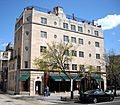Greek Americans facts for kids
  |
|
| Total population | |
|---|---|
| 2,500,000 0.75% of the U.S. population (2010) |
|
| Regions with significant populations | |
| Languages | |
| Religion | |
| Predominantly Greek Orthodox |
Greek Americans (Greek: Ελληνοαμερικανοί, Ellinoamerikanoi) are Americans who have full or partial Greek ancestry. More than 2.5 million people in the United States have Greek roots. In 2010, about 350,000 people over the age of five spoke Greek at home. This shows how many Greek Americans keep their language alive.
Contents
Coming to America: Greek Immigration
Many Greeks came to the United States looking for a better life. This movement of people is called immigration. Most Greek immigrants arrived in the late 1800s and early 1900s. They often came from small villages in Greece. They hoped to find jobs and new opportunities in America.
Why Greeks Immigrated
Greeks left their homeland for several reasons. Some were looking for work and a chance to earn more money. Others wanted to escape difficult times in Greece. They heard that America was a land of opportunity. Many young men came first, planning to earn money and then return home. However, many ended up staying and building new lives.
Where Greek Immigrants Settled
When Greek immigrants arrived, they often settled in big cities. These cities included New York City, Chicago, Boston, and Detroit. They also formed strong communities in places like Tarpon Springs, Florida. This city has a very high percentage of Greek Americans. In these communities, they could find support and keep their traditions.
Greek American Culture and Traditions
Greek Americans have worked hard to keep their culture alive. They celebrate their heritage through language, food, and religion. The Greek Orthodox Church is very important to many Greek Americans. It serves as a center for faith and community gatherings.
Celebrating Greek Heritage
Greek Americans love to celebrate their culture. They often hold festivals with traditional Greek music and dancing. These events are a great way to share their traditions with others. You can find many Greek restaurants in American cities. They serve delicious dishes like moussaka, souvlaki, and baklava.
Greek Language and Media
Even though most Greek Americans speak English, many still learn Greek. This helps them connect with their heritage. In the past, there were Greek-language newspapers like Atlantis. These papers helped immigrants stay informed and connected. Today, Greek American communities still have schools and cultural centers. These places teach the Greek language and traditions to younger generations.
Greek American Contributions
Greek Americans have made many important contributions to the United States. They have succeeded in many fields, including business, politics, and the arts. Their hard work and dedication have helped shape American society.
Community Organizations
Organizations like the American Hellenic Educational Progressive Association (AHEPA) are very important. They help Greek Americans connect and support each other. These groups also work to promote Greek culture and values. They often help new immigrants and support educational programs.
Famous Greek Americans
Many Greek Americans have become well-known figures. They have served in government, started successful businesses, and excelled in sports and entertainment. For example, US presidents often celebrate Greek Independence Day. This shows how much Greek Americans have contributed to the country.
Images for kids
-
A young Greek immigrant on Ellis Island, New York City, late 19th century
-
Sponge auction in Tarpon Springs, Florida, in 1947. The community has the highest percentage of Greek Americans of any city in the US
-
Distribution of Greek Americans according to the 2000 census
-
The New York City Metropolitan Area, including Long Island, New York, and Bergen County, New Jersey, is home to the largest Greek population in the United States.
-
US President George W. Bush welcomes Archbishop Demetrios to the White House to celebrate Greek Independence Day and to recognize the contributions of Greek-Americans to American culture in March 2007
-
American Hellenic Educational Progressive Association headquarters in Washington, D.C.
-
The new National Hellenic Museum, Chicago
See also
 In Spanish: Inmigración griega en Estados Unidos para niños
In Spanish: Inmigración griega en Estados Unidos para niños
 | Sharif Bey |
 | Hale Woodruff |
 | Richmond Barthé |
 | Purvis Young |












